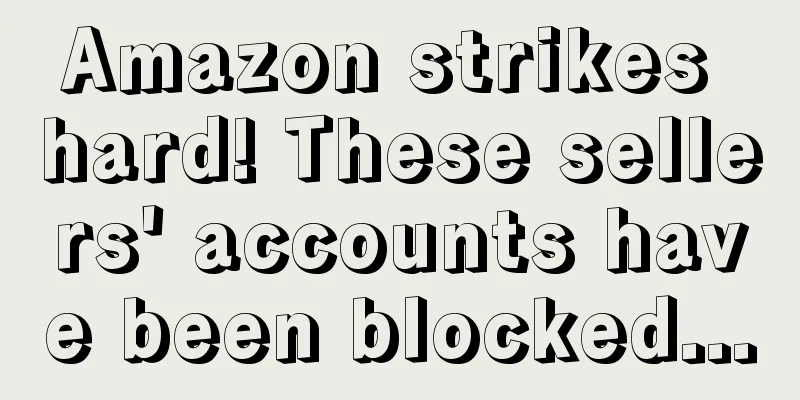Amazon sellers' orders are interrupted! Will the shopping cart undergo major changes?

|
Last night, many sellers suddenly reported that there were abnormal interruptions in orders, with no orders shown for several hours. They didn’t know whether it was due to data delay or a problem with the front desk. This morning, some sellers were affected and had no orders all night, while some sellers began to gradually resume orders. Later, some media on the Internet revealed that due to the unexpected power outage, some areas were unable to access the Amazon Mall website. Amazon often crashes due to bugs, which prevents buyers from shopping, causing sellers to lose a lot of orders. However, power outages are a relatively rare cause. Many sellers were affected, and it is estimated that Amazon's key computer room lost power. The situation began to gradually recover in the morning and was basically normal by noon, but Amazon did not announce the power outage or investigate the cause. We don't know the cause of the power outage and there is no way to prevent it. Everyone should pay more attention to whether there are any abnormalities in orders in the next two days. Another thing happened today. Amazon and European regulators reached an agreement and made a preliminary compromise on antitrust issues. The compromise includes giving more opportunities for non-FBA products to be displayed. The antitrust agency cited the example that Amazon’s current shopping cart policy heavily favors FBA products, and products that are not delivered by Amazon cannot grab the shopping cart, and the chances of being ordered are much less than those of FBA products. The agreement reached between Amazon and European regulators includes giving more non-FBA products more opportunities to get into shopping carts and appear in search results. Amazon will also open the Prime program to third-party logistics sellers as long as they meet certain delivery time requirements. The latter content sounds like the SFP program, but I believe that with the intervention of antitrust agencies, this threshold will not be too high, and there will be regulators to ensure that Amazon will not favor FBA products when implementing it. Overall, this is good news for sellers. Amazon’s preference for FBA and self-delivery products is well known. The business environment for self-delivery sellers has been getting worse in the past two years. Amazon’s tightened return policy for self-delivery and further reduced the push for self-delivery products have made it difficult for sellers who use the self-delivery method to move forward. After the EU bill, this situation will be improved in a targeted manner, and self-delivery products will definitely have more opportunities in the future. |
<<: The US dollar exchange rate fell below 7! Where will the sellers' profits go?
Recommend
What is an APUK account? APUK account review
APUK is a payment system developed by Amazon speci...
Is the growth dividend from the pandemic exhausted? 2023 US e-commerce research report
It is learned that recently, FTI Consulting releas...
Latest Solution | How to deal with differences in shipments?
On the Inventory tab, click Manage Amazon Shipmen...
Amazon Clearance Scam Service Providers, expose them as soon as you see them!
When you do business on Amazon, have you ever enco...
A large number of sellers have inexplicably received a surge in orders! Be careful not to sell too much and your store will be closed!
Today, many sellers were discussing in our group ...
In order to regain market share, Walmart has reached a cooperation with Canadian home retailer Furniture.ca!
<span data-shimo-docs="[[20,"获悉,据外媒报道,近日沃尔...
Halloween product trends revealed! Americans are expected to spend more than $10.1 billion!
<span data-shimo-docs="[[20,"预计美国人将在万圣节支出超...
What is the Community Mentor Program? Community Mentor Program Review
The Community Mentor Program is a project launched...
What is rebeccaminkoff? rebeccaminkoff review
Rebecca Minkoff is an emerging fashion designer ba...
21 million toy sets recalled by CPSC! Available on Amazon, Walmart and other platforms
It is learned that the U.S. Consumer Product Safet...
What is LinkedIn? LinkedIn Review
LinkedIn, also known as "Ling Ying" in C...
Another children's product has been urgently recalled! It has been sold in large quantities in Canada and the United States!
<span data-docs-delta="[[20,"获悉,据外媒报道,7月7日...
Operation Tips-Solutions for Amazon Store Closure
First of all, let me ask everyone, if your accoun...
What is LifeOfPix? LifeOfPix Review
LifeOfPix is a website that provides free high-d...
Amazon laid off 9,000 employees again, but sales rose against the trend and reached 3.5 billion
In the past two years, the macroeconomic downturn ...









